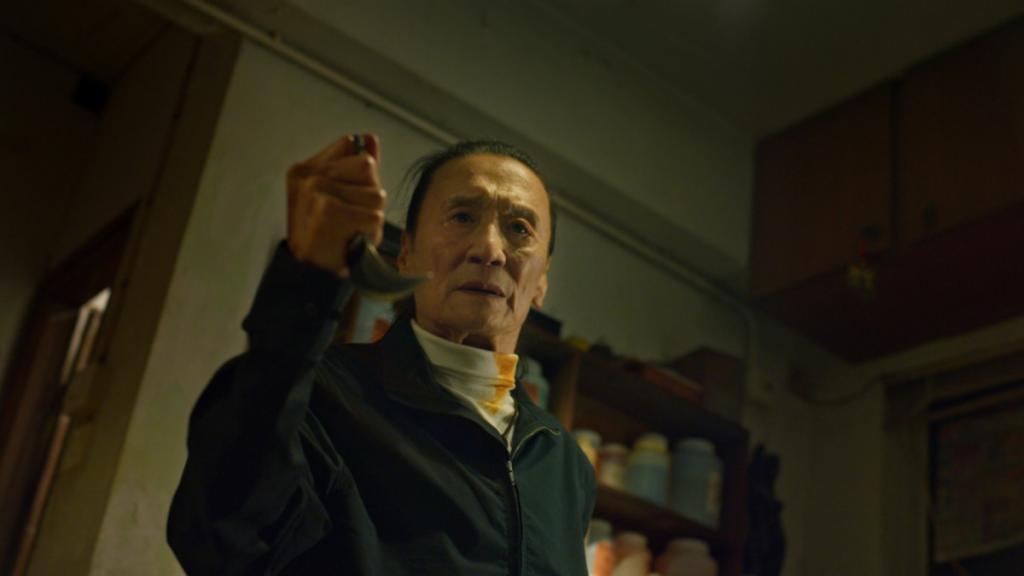Playing like a vingette out of the 1970s, the intro to Ricky Ko’s directorial debut, Time, dives right into the 60s as we meet younger versions of our killer-for-hire trio, Chau, Fung and driver, Chung. A robust music score accompanies and enlivening opening action scene that falls short of mimicking classic 70s cinema, but still does its own thing in invoking a proper flashback to help pave the way for our characters, including Chau as he whips out his legendary karambit, corners an underworld boss and has his way with him.
Fast forward to present day and the young, spritely killers Chau and Fung once were, are very much far from their heyday glory: Chau (Patrick Tse) is forced to contend with modern technology when he’s fired from the restaurant he worked as a noodle chef for not being expedient enough; Fung is now a grandmother working as a cabaret singer stuck living with her slacker son (Sam Lee), grandson, and begrudgingly, his incorrigible wife; Chung’s (Lam Suet) own presumed prospects currently fall with a prostitute he hopes to marry one day, as he regularly tends to her as long as he can afford it, despite his own poor health.
Beneath the veneers of their idyllic and stoic lives, however, they still have the itch to get back onto familiar ground, with Chau pulling out his famous karambit knife once more. Reluctant at first, Chau and the others find themselves at an opportune moment of renewed purpose when the elderly and sick start hiring hitmen for their own end-of-life purposes, and they soon start raking in the cash forthwith, with Fung organizing the jobs, Chung at the wheel, and Chau putting his newly-sharpened old knife to swift use.
What they least expect is when a suicidal young teenager name Tsz-Ying (Chung Suet-Ying) reveals herself and pretty much shoehorns her way into Chau’s personal life. Just short of ready to snap, Chau’s terse and laconic demeanor proves ineffective as Tsz-Ying decides to set up camp and refusing to leave otherwise. What ensues is a slowly-but-surely burgeoning friendship that even Tsz-Ying likens to as the family she needs, especially right when she’s at a tipping point in her personal life that ultimately compels Chau to play a more engaged role.
Par for the course as the 20th New York Asian Film Festival premieres several films involving this year’s Variety Star Asia Award recipient, Gordon Lam Ka Tung, Ko’s Lam-produced outing intends itself, in part, to be a festive homage to bygone heroics of Hong Kong yesteryear. Between this aspect of the film and its more pensive, melodramatic tones and sprinkles of dark comedy throughout, there’s a healthy balance at work that all but reassures the film’s more ebullient and humanitarian air, with solid performances from our legendary cast to boot.
There’s a certain tenderness and vulnerability that gets explored every now and then, which speaks largely to much of the impact our characters deal with oftentimes. Next to living in a more modern world, Chau, Fung and Chung have to deal with the cultural clash that glimmers with the subtle sadness of feeling left behind and knowing they’re close to the twilight of their lives, in the face of their own resilience. The gloom does subside though, when our three main characters share the screen together, as their bond remains grown on you from the very start. Theirs is a friendship born out of loyalty and teamwork, and moreso an understanding of one another. So in the film when we see them plotting against someone who’s wronged Tsz-Ying, you know they’re on the same page, and for a good cause, no less.
The heart of the story is undoubtedly Tsz-Ying, with a performance by actress Chung that evolves with each scene. Usually a character like hers in certain films is written with such throwaway value that the person at the pen either tries to make this character either the most loveable, or more often than not, the most annoying and hated. Thankfully, Ko aptly manages to avoid these tropes, allowing Tsz-Ying to become the heart of the film, and the driving force of our protagonists that she’s meant to be.
Action director Lo Chun Pang puts in the work to foundate our characters in both eras, with Tse visibly able to handle his fair share of on-screen hand-to-hand, thanks to some nimble editing and lensing, and ornamental visual effects to spruce up the performance caliber some, all a distance from the typical and tired “Greengrassian” approach to action. Actress Fung’s character gets to utilize her old chain whip technique which has since grown rusty with time, with each intended hit still amiss with an otherwise terrorizing effect.
Written by Lam and co-scribe Ho Ching Yi, the subtext overall in Time isn’t lost on the viewer, nor Ko for that matter. His is a story that centers on three septuagenarians, flawed and still discovering themselves in ways they either never expected or at one point disavowed. It’s a brilliantly told and tastefully executed assassin tale, and with veracity, the kind that speaks to anyone who is, or understands or sympathizes with the experience of coming to terms with old age and the passage of…well… time, opposite the footprints we leave behind for the next generation when we’re gone.
Time is screening for the 20th New York Asian Film Festival which runs through August 22.


